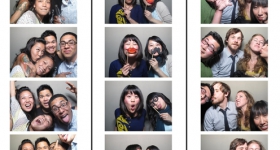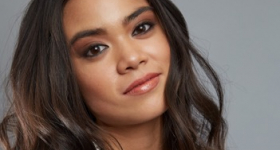As a pop band with a political edge and an all-Asian American membership, The Slants have been rocking identity politics from a peculiar angle for over a decade. But when they tried to formalize their band name to help establish their brand, their career in rock took an unexpected turn: the government deemed their band name too racist to officially trademark, forcing the band into a legal battle that went all the way to the Supreme Court and ended in June with a victory for freedom of speech that resonates wider than any of their power chords. Michelle Chen speaks with Slants frontman Simon Tam about what their constitutional struggle means for diversity in the rock scene, the creative industries and Asian American identity.
Describe the band and your approach to music.
A lot of times people call us the world’s first and only all-Asian American dance rock band. For us, the music kind of hearkens back to our childhood — bands like New Order and Joy Division, Depeche Mode and The Cure — really synth-y, poppy, British-influenced music that kind of became the backdrop for a lot of kids that grew up in the ’80s, including that wave of second-generation Asian Americans. For a lot of us, it’s like the soundtrack to our youth.
Do you take your profile as a distinctly Asian American phenomenon as the focal point of your activism?
The primary focus is issues that have an Asian American lens to it, but we certainly try and provide support for areas of intersectionality or other issues that we’re passionate about. For example, in the past year, we wrote a song called “Anthem,” which highlights the injustice of the lack of police accountability when they shoot unarmed black men. It’s our way of supporting the Black Lives Matter movement. Other times people will approach us and say, “Hey, we know you have this platform; are you willing to talk about this cause?”
That’s rare in the pop world and rare within Asian America, too, in many ways.
I think our birth as a community in terms of political identity is a lot later than many groups. Most people trace back the activism of our community [to the time] when we started saying, “Hold on a second, we’ve been divided into all of these separate, different little microcommunities. If we actually worked together as one more unified voice, we’d be able to get more done. We’d be able to advocate for a lot more on behalf of shared experiences.” So, I think our community is kind of learning how to leverage its power.
Why did you decide to continue with your legal battle for so long?
When we were rejected by the trademark office on the premise that our name is disparaging towards people of Asian descent, it was really mind-boggling for us.
The only evidence they had that the term was offensive was urbandictionary.com, a wiki joke site. We thought, “How come our community’s voice doesn’t matter?” We felt like they were stripping the agency from our community to determine what’s best for ourselves. And I found out that the law we were fighting against, Section 2a of the Lanham Act, has been disproportionately used to target communities of color and members of the LGBTQ community because those tend to be the groups that re-appropriate language. They were using our own identities against us.
[In our response, we said], “You’ve registered ‘slant’ dozens and dozens of times. Why is this the only one in U.S. history to be denied registration on the premise that it’s racist toward Asian people?” They responded by saying, “It is incontestable that the applicant is of Asian descent and part of an Asian band.” And then they went on to prove how Asian we were by pointing to Asian people on our website, which, of course, was us, and the Asian imagery we used on some of our album covers, basically saying that because we were so Asian — like super-Asian — people would automatically associate the word “slant” with an outdated and obscure racial slur.
That’s just a weird thing to think about. They decided to use the full weight of the government’s power based on a joke website. If we were an all-white band, this wouldn’t have been an issue. We wouldn’t even have that conversation.
They sued you for the right to tell Asians how not to be racist against yourselves.
[The Patent and Trademark Office (PTO) staff] are not taught issues like cultural competency. If the government was sincere in fighting racism by using the PTO as its vehicle, why not begin by canceling registrations for known white supremacist hate groups like the KKK or Stormfront? But they’ve never done so. They’ve continued to defend those things, calling them respected historical societies and organizations.
I knew a while back that this was a lot bigger than our band. It’s more about the principles involved. At the end of the day, hopefully, we can keep trying to drive home that message — that ultimately, communities should be able to determine what’s best for themselves. Agencies like the PTO don’t understand identity politics, so we know that we need to take that bit of power back.
What about the controversy over the Redskins football team trademark lawsuit that got tied in with yours? Did that affect the way people reacted to your legal battle since people feared that your pro-free expression argument would indirectly help the Redskins case?
A lot of times, people present us with the false dichotomy of free speech versus civil rights. The reality is that you have to protect individual liberties for civil rights. Oftentimes, those liberties aren’t necessarily granted to the marginalized, the people who have less influence or money or agency in society. We need to protect those rights, even if it means some people will abuse them at times, to ensure that when our communities need them the most, they will be granted and protected for us.
We have to recognize that even if the Redskins’ trademark had been canceled, it would not have forced the team to change the name. What I hope moving forward is that this will redouble efforts to think of other more creative strategies to get the mascot changed and also shine a light on other issues that the Native American community faces. And hopefully [our case can] highlight some of that.
What’s kind of interesting is that, following the ruling, we actually saw a huge rise in followers from the far right and from fans of the football team because they thought that we were just these ultra-libertarian warriors of free speech, not realizing that we also use our power of social media to call attention to these issues. So now we’re trying to educate them while having a bit of credibility with that community.
These days, there’s been a lot of debate over student activism and how campus groups on both the far left and the far right seem to clash over who should be allowed to hold public events or make speeches. How should we respond to those kinds of disputes?
I think people are still trying to figure that out. Because both sides see themselves as right to their core, and they should be able to make an exception to the First Amendment when it comes to people they disagree with. As communities, we don’t need to venture into these extremes. We don't have to shut other people down because it doesn’t actually make a better learning experience. It doesn’t build a better community when you do that.
Words are not in and of themselves poisonous. I think of words like a blade. In the hands of an oppressor or someone with harmful intent, they can be used to hurt. But in other hands, they can be used to heal, like in the hands of a surgeon. The same thing with our words or imagery. Racists are going to do obscene things with any word. But in other hands, in the hands of people who have purpose, a mission and values, we can use it to create healing in our own communities or inspire people to rise up for themselves.
This interview has been edited for clarity and brevity. Parts of this interview also appear in a forthcoming issue in Dissent Magazine.










Comments